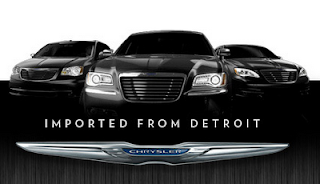Imported from Detroit
 This year’s Super Bowl commercial highlight was the Imported From Detroit; Chrysler’s two minute homage to the rebirth of the American auto indusrty. If you haven’t seen it, it is the embedded video at the top of the MKIA page. Starring Eminem, it takes us on a gritty tour of Detroit with the message saying the hardest steel is forged from the hottest fire. Given our own history in Youngstown, it was ultra appealing to me, even giving a serious tear to my eye. We get it!
This year’s Super Bowl commercial highlight was the Imported From Detroit; Chrysler’s two minute homage to the rebirth of the American auto indusrty. If you haven’t seen it, it is the embedded video at the top of the MKIA page. Starring Eminem, it takes us on a gritty tour of Detroit with the message saying the hardest steel is forged from the hottest fire. Given our own history in Youngstown, it was ultra appealing to me, even giving a serious tear to my eye. We get it!The question is does the rest of the nation? Detroit comes to us with a lot of baggage. Ford is experiencing resurgence with numerous top notch auto entries, and gets kudos for not needing a government bailout. It is a long way from “Fix Or Repair Daily” days. General Motors has a hit with the Cruze. The efficacy of the Volt has yet to be proven, but Buick is breaking out as a major brand, especially in China. For the first time in its history, GM has made more money overseas than in the United States.
Chrysler is making some moves, integrating even more with Fiat, the Italian automaker that came to its rescue. If its cars match this ad, I may even give it a look the next time around. Takes you back to when the Chrysler Imperial was the luxury car of choice, and Chrysler led the way in automotive engineering.
It’s important that America make things. But we have given it away, industry by industry. The bankruptcy of General Motors and Chrysler was an embarrassment to the nation. The subsequent bailouts were understandable, but have left a bad taste in America’s sensibility palate. Why did foreign automakers thrive in the United States, survive the financial crisis, while the largest automaker in the world went belly up? Did the bailouts solve any of the fundamental issues, or did they only allow the resurrection of corporations suffering the same problems as before but now with the government imprimatur?
The primary way a traditional capitalist government can help industry is through proper tax, regulatory, labor, fiscal and monetary policy. The current administration may have blown the dust off some corporate dinosaurs, but may have left them ultimately stuck in the tar pits. In fact, given the social justice culture it has tried to instill in GM as a condition of the bailouts, it may have shoved it further in the muck.
Although all carmakers in the United States are subject to the same regulations at the base level, General Motors and Chrysler still have to deal with an archaic union structure in states with archaic tax structures based in something else other than what is good for manufacturing. They are structured with boards of directors designed to appeased social justice demands rather than demands of industry.
I am not sure how all of this is going to work out. I wish General Motors and Chrysler well. We all want American companies to succeed. I hope that Chrysler lives up to the promise in its gritty and emotional Super Bowl advertisement. I hope the Volt knocks it out of the park. But I have my doubts. I truly hope that I am wrong.


Comments